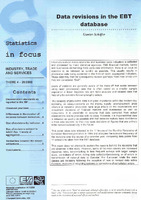Statistics in Focus. Data revisions in the EBT database.

Working Document
Συγγραφέας
EU Commission
Ημερομηνία
2000-10-04Προβολή/
Θεματικές επικεφαλίδες
Economic and Financial Affairs ; StatisticsΠερίληψη
Information about macro-economic and business cycle indicators is collected and processed by many statistical agencies. With financial markets, banks and businesses demanding more up-to-date information, there is an onus on statistics to be released as quickly as possible. This usually results in provisional data being published in the form of rapid, aggregated indicators.
These data may then be subsequently revised (perhaps more than once) until they are considered "final" 1.
Users of statistics are generally aware of the trade-off that exists between using rapid (provisional) data that is often based on a smaller sample population or lower response rate and more accurate and detailed data that may only be available following lengthy delays.
The reliability of provisional data is of great importance within the modern-day economy, as announcements on the money supply, unemployment, price inflation or industrial production have large effects on the expectations and investment decisions of financial markets and businesses as well as consumers It is unrealistic to assume that data compiled from actual observations can be provided with no delay. However, it is important that data is released as quickly as possible and that decision makers have confidence in their data sources, so they may base decisions on figures that are unlikely to be revised substantially in the future.
This paper takes data released in the 11 issues of the Monthly Panorama of European Business published in 1999 and analyses the size and frequency of the revisions over the course of a calendar year, comparing data points from 11 extractions taken from the EBT database.
